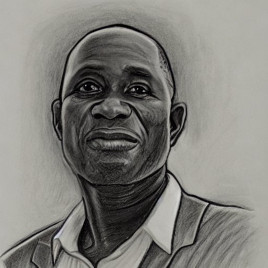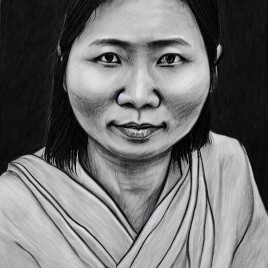Scenario Narrative
Unofficial agreement of international zones of influence
The geopolitical world of 2032 has settled into an uneasy stability, with major world powers having reached an unofficial agreement to solidify their respective zones of influence around the world. This has led to less sabre rattling and has reduced the threat of large-scale armed conflict. Economic development programmes are launched in transit countries where an increasing number of asylum seekers have been blocked on their way to preferred destinations. While the multipolar geopolitical world has matured and hardened its ‘borders’, it has also realised the necessity for transit countries to have and maintain social and political stability. This has led to recognition by global power centres that transit countries’ burdens should be widely shared and that efforts should be made to ensure the viability of certain regions.
Focus on economic development in transit countries
The economic development of transit countries, particularly along borders and within migrant and refugee communities, has been the focus of many intra-governmental initiatives and public-private partnerships. These developments have a mixed track record regarding the treatment of employees, the safety of their working conditions and links to crime and corruption. At the same time, new community economic opportunities, education systems and collaboration between local and migrant populations have emerged in more successful instances. Migrants and asylum seekers in economically developing transit countries have found opportunities to participate in many economic sectors – characterised by both unskilled labour force and educated workforce using skill-intensive technologies – including various types of telework.
Increased control over personal data and remote asylum procedures
Remote asylum procedures as a supplement to the established procedures have done much to expedite decisions on asylum applications. However, the imperfect analysis algorithms used to speed up application processing are known to demonstrate biased evaluations unable to appropriately account for unique applicant circumstances. Digital operations rely on secure, user-controlled profiles that asylum seekers create and utilise to access various services, including aid in the form of restricted-use, government-backed digital currencies. Individual digital autonomy and control over personal data have increasingly become foundational digital governance policy in a number of economically powerful nations. This shift has begun reshaping the relationship between people, their data and social institutions through the rise of decentralised autonomous organisations and next-generation internet technologies. As these projects tend to be open source, the technologies that ensure security and autonomy of personal data are replicable, while the asylum seekers’ profile and identity systems have proven reliable and robust against digital attacks. Furthermore, the ability to collect and monitor anonymised data enables large-scale analysis and monitoring of individual contexts and environments to keep people more safe and secure, regardless of their status as a citizen or asylum seeker. In some cases, intelligent systems have been employed to use digital profiles to better match asylum seeker skills, training and experience with sponsorship opportunities in asylum granting states. However, the emphasis on user control and data sovereignty has not removed the concern regarding abuses of digital surveillance. Though intra-governmental and/or international organisations attempt to transparently regulate the use of data for surveillance activities, not all countries comply with these efforts and there remain many organisations (public and private as well as criminal) that continue to conduct both mass and targeted surveillance.
Expansion of ‘dark web’ in response to digital surveillance of oppressed minorities
One arena in which digital surveillance practice remains particularly divisive is the issue of respecting and protecting minority groups. Minority rights have been increasingly recognised and protected in some geopolitical regions, particularly those in which democratic governing principles are being strengthened and supported. However, minority-group protection policies are by no means universal, particularly in those regions where democracy is withering and more authoritarian governance systems are being reinforced. There is strong evidence that despite protective policy meant to regulate digital networks and technologies, both state and criminal actors have been using digital surveillance to target and actively harass minority groups within some regions. Thus, despite the regulatory and mediating actions that have been taken to create a safer and more reliable social media landscape, the ‘dark web’ of anonymous and uncensored networks has only expanded and increased its capabilities. While criminal elements drive the development of these decentralised, untraceable, encrypted social media, it has become an essential communication tool for oppressed people living under regimes of constant digital surveillance and physical threat.
Intensified environmentally-rooted migration
Food and water shortages are becoming more habitual, of longer duration and creating more intense scarcity. Despite the deployment of numerous technologies to mitigate climate change-induced extremes – heat, drought, desertification, typhoons/hurricanes, floods, etc. – the unpredictability of when, where and at what intensity the effects of climate change may manifest dampens the efficacy of technological solutions. In some areas, where strong support for third countries exists, financial aid and transparent land ownership policies are tied to and allow for localised rebuilding and resettling. However, outside of these supportive conditions, there are many regions where the migration drivers rooted in environmental changes are becoming more intense. In these situations, many migrant groups are unable to apply for asylum before ecological disruptions inspire dangerous, life-threatening societal responses, such as forcible displacement, targeted oppression and civil conflicts.
Scenario Personas
Disclaimer: The images used for the scenario personas are not real people.

Amadou
Amadou is 45 years old and he thinks he is getting too old for this. He had been part of the middle class back in Mali but was forced to flee that life after climate changes increased violent land grabbing by the local authorities. At first, he thought his move would be temporary and that he would be able to make a living working in a neighbouring country.After all, his higher education and experience as a manager had brought him a good living income in Mali. However, after years of working informally and slowly draining his savings, he believes that he will never be able to return, nor make a decent livelihood in his home region. He trusts that the international protection system will "protect" those who cannot live in dignity and have been victims of past persecution. He is confident that his land property certificates and his wedding certificate will be enough to prove his identity and that of his family. He has learned much from migrants in resettlement camps, through social media groups and from acquaintances who are already in Europe. He was identified by an artificial intelligence data processor as having a high likelihood of success, but he is afraid that he will not be able to reach a safe place to lodge the final application.

Zin
Zin is 35 years old, hailing from Myanmar. The continuing persecution of individuals who are associated with anti-government protests seems to be getting worse for people like Zin. As a highly educated and technically skilled worker, she has assisted digital operations of civil organisations as a volunteer for many years. Now she is starting to fear for her life and livelihood, as her online identities were recently de-anonymised in a database breach orchestrated by the government. She has an ID card and a decent digital record of her accounts, posts and pictures. She has been assured that the artificial intelligence-enabled application assistants can put the pieces together for her, if only she can gain access to the system. The government restrictions on digital access have only been tightened since the database breach and her digital skills might only get her so far in accessing the open internet for long enough. She is very concerned about the exposure of more of her private data, particularly to a system that is hosted in a foreign land with no obligations to help – even if her application was accepted.
Scenario Challenges
Geo-Political Challenges
- Disagreement on the adoption of conventions regarding the acceptance and treatment of ‘climate refugees’ complicates relations between nations on opposing sides of such a stance. In this scenario, cooperation without such conventions may imply complex legal arrangements that would affect authorities in the field of international protection.
- The economic development of traditional transit countries has a complicated impact on general migration and asylum-seeking. At the same time, we might observe increases in international protection applications (with more wealth enabling more families to afford the journey), and less economic migration as greater wealth lowers incentives to migrate.
- Legal and cultural differences, and non-complimentary socio-political goals make global cooperation very difficult, and hinder the development of binding agreements within global governance institutions like the United Nations.
- The new types of cooperation on international protection outlined in this scenario are intentionally vague, with details concerning bi-lateral or multilateral agreements are too specific for the scenario. This ambiguity does not erase the fact that any efforts between nations will remain burdened by unaddressed challenges (e.g. resettlement, aid, lodging and caretaking, security screening, etc.).
Digitalisation and Data Challenges
- The use of artificial intelligence and automated systems imply a major shift in application processing operations (electronic processing, remote interviews). Additionally, this scenario calls for human oversight of automated systems, implying additional training and skills are needed to understand and properly assess automated system results.
- This scenario implies that various online platforms and technologies will be used to assist in verification of asylum applicant identities and outlines present day challenges that would have to be addressed for this scenario to be realized:
- Established information sharing agreements between governments and government entities
- Regulating social media to ensure information is trustworthy
- Securing private data and guarding against future cybersecurity issues and attacks.
Climate Change Challenges
- Since international organisations and some countries are expected to begin including climate change as a legitimate reason for granting international protection, this creates challenges with respect to requiring additional climate-related information in case processing and altering the criteria for assessing asylum applications.
- Additionally, if such an approach to ‘climate refugees’ is not universally approved (via a UN resolution for instance), then the asylum procedures may become complicated by unequal approaches.
- While this scenario presents a world in which there are concerted international efforts to confront climate change, it acknowledges that climate change effects are still developing and causing disruption and displacement in many places.